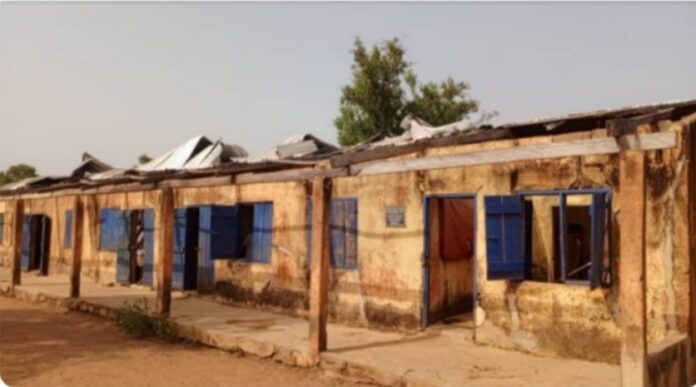Students and teachers at Jantong Dashie District Assembly Junior High School in the North
East Gonja District of the Savannah Region have endured harsh learning conditions for five
years after a rainstorm destroyed the school’s roof.
Built-in 2007 with support from philanthropist Anouk and Friends, the classrooms have since been exposed to extreme weather, frequently disrupting lessons due to intense heat or rainfall.
This dire situation has severely impacted academic activities, with teachers often forced to end lessons prematurely to protect students.
These frequent disruptions have made it nearly impossible to maintain a steady academic
calendar, leaving students unprepared for crucial examinations like the Basic Education
Certificate Examination (B.E.C.E.).
Some students have voiced their frustrations with Graphic Online’s Simon Unyan over the poor learning conditions, questioning the authorities’ commitment to equitable education.
Fuseini Abdul Malik, a student, asked, “Do we not deserve better education like other children in Ghana?”
Sandow Ajara, another student, shared her fears about her academic future, saying, “If this situation continues, how can I focus on my studies when teaching and learning are constantly disrupted?”
Teachers have also expressed alarm over the broader impact of the situation. Idrisu Musah, one of the school’s teachers, highlighted declining enrollment as a critical issue.
“Our numbers were encouraging before, but since the structure was damaged, many parents have withdrawn their children, citing the lack of a proper learning environment.
The structural defect has disrupted our academic calendar. As we speak, we are nearing vacation, but we haven’t covered the syllabus, and the students are expected to write exams soon,” he explained.
Despite repeated appeals to the district assembly, no tangible solutions have yet to materialize.
Abdulai Fuseini, the Assemblyman for the Jantong Dashie Electoral Area, shared his frustrations.
“The Assembly one time sent an engineer to inspect the building and concluded that it was unfit for use, recommending a new structure. Yet, nothing has been done since then,” he said.
Frustrated by the lack of progress, the Chief of the Jantong Dashie Traditional Area, Jantongwura Abdullah Mahama, expressed disappointment despite his significant contributions to the rebuilding efforts.
“One time, they brought sea sand here to mold blocks for the construction, but when the workers arrived, there was no cement. I donated 50 bags of my cement to mold the blocks, but now the blocks are sitting idle, and no one seems to care,” he lamented.
The chief has warned that: “If they [District Assembly] don’t come to construct the school, I will retrieve the blocks. Five years without action is unacceptable. Our children’s education is at stake,” he stated.
The situation at Jantong Dashie D/A Junior High School underscores the urgent need for
investment in rural education infrastructure.
Without immediate action, the futures of many of these young learners remain uncertain.
Students, parents, teachers, and traditional leaders are calling on authorities to prioritize this crisis and restore the school to a functional state.


